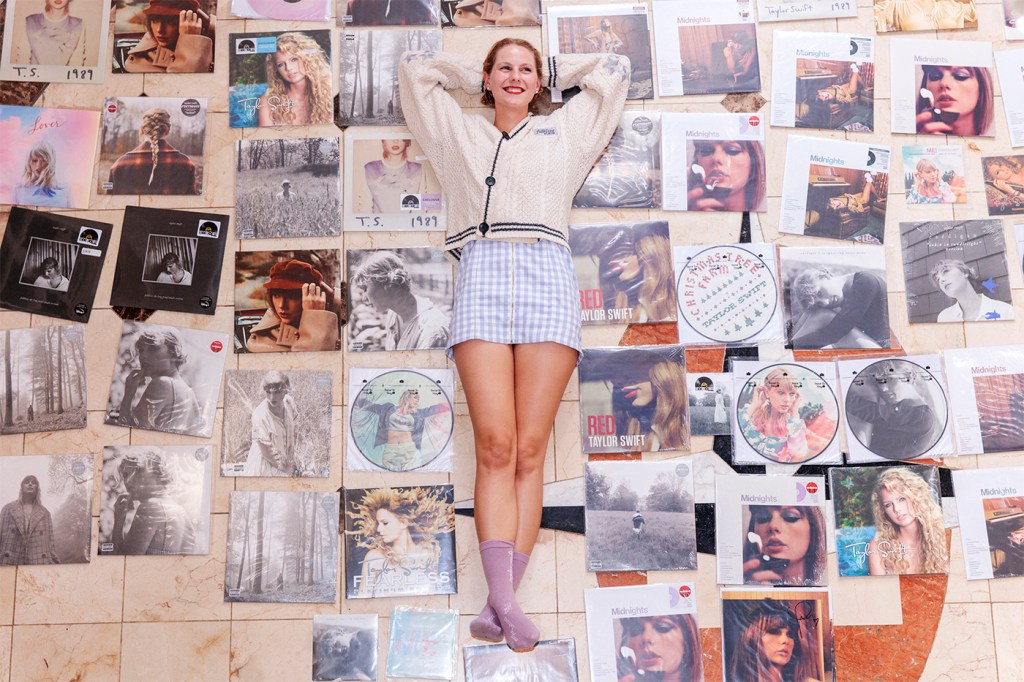Taylor Swift keeps releasing different vinyl editions of “The Tortured Poets Department.” Is this wasteful?
Billie Eilish recently called out artists who make multiple variants of the same vinyl like Swift does.

When Taylor Swift announced the upcoming release of her latest album, “The Tortured Poets Department,” fans scrambled to preorder the vinyl version of the album.
But a few weeks later, Swift announced she was releasing another edition of the album, “The Bolter,” with an exclusive bonus track. Then she announced another new edition with another exclusive track a few weeks later. And then another.
Devoted fans were faced with a conundrum. Do they buy multiple copies of essentially the same album just for access to different bonus tracks? Swift’s decision has drawn some criticism. Without naming Swift, artist Billie Eilish said in an interview with “Billboard” that artists who release different versions of the same vinyl in order to boost sales are “wasteful.”
But Swift is not the first artist to do this, said Andrew Mall, an associate music professor at Northeastern University. Swift is part of a larger trend of those “gamifying” vinyl collecting, where consumers will buy every variant of a record — whether they offer a different cover, record color, or bonus tracks — in order to complete their collection. She is doing similar releases on CD.
“It’s definitely not something that she’s pioneering,” Mall added. “It’s the gamification of vinyl production and collecting to provide something that the audiences are asking for, even if there are other corners of your fandom or consumers in general that might be criticizing it. Many artists, many of whom are much smaller than Taylor Swift, release multiple versions of the same record, sometimes with different covers, sometimes with bonus tracks. Completists will go out and buy a dozen different copies because it’s important to them to have every copy that’s been produced.”
Rebekah Moore, an assistant music professor at Northeastern, said pop stars in Japan and Korea also commonly sell deluxe edition CDs and vinyl records. But for many, it’s not about collecting these items to listen to, but as memorabilia. A lot of artists (including Swift) sell cassette tapes.
“People buy multiple editions,” Moore said. “They collect them like baseball cards. They’re not playing them; they’re appreciating them as a piece of memorabilia.”
Swift has been doing some variation of exclusive releases since her album “Red” in 2012. There was a deluxe edition of the album with six extra tracks exclusively available for purchase as a CD in Target. Over time, her strategy has evolved from exclusive CDs to vinyls. For her last album, “Midnights,” Swift released several different editions of the vinyl with different covers that formed a clock if you purchased them altogether. People bought them.
“It’s so similar to strategies from J-pop and K-pop,” Moore said. “It makes me curious how much she and her team have leaned into the high commercial value of special editions.”
For “The Tortured Poets Department,” Swift announced the new editions one by one, meaning fans may have already preordered the album before finding out about the new edition. This prompted some people to continue to place preorders for the different editions.
“There’s legitimate value to doing that,” Mall said. “You’re increasing your fans’ engagement with your music. You’re racking up sales and more revenue. The thing that annoys me about Taylor Swift’s strategy right now is that she released the preorder and then staggers. … So if you want to order all four, you have to submit multiple orders and pay for shipping four times. … That’s a wasteful aspect.”
But there is a faction of Swift’s fandom that is frustrated by her strategy, which not only requires a significant financial investment to have access to all the bonus tracks, but also creates waste.
“As somebody who cares deeply about reducing plastic pollution in the environment, this isn’t something that I choose to engage with as a fan,” said Catherine Fairfield, a postdoctoral teaching associate in English at Northeastern who taught a course on Swift’s music. “I’m not out there buying multiple versions of anything, and I know that a lot of the fandom is frustrated by this, whether it’s the environmental consequences or financial aspect of it. I also know that Taylor Swift isn’t the only person doing it. This is unfortunately a really common phenomenon.”
For example, Eilish herself is releasing eight different colored variants of her upcoming album “Hit Me Hard and Soft.” The vinyl will be produced with recyclable materials in order to reduce waste.
While creating a vinyl does have an environmental impact, Mall pointed out that fans keep these records. Even if they do choose to dispose of them, there is a way to recycle them.
On the flip side, streaming music still creates environmental waste through the greenhouse gas emissions to power server farms that allow for streaming. Some experts suggest that enough hours of streaming can produce the same amount of carbon emissions as the creation of a CD case or vinyl record.
“Fans aren’t throwing these (records) away,” Mall said. “This is not stuff that’s ending up in a landfill. … It’s almost impossible to compare the environmental impact of vinyl records with the environmental impact of streaming music.”
In the case of Swift, many fans may be driven to buy her variants in order to hear her additional material. However, in the past, Swift has eventually released songs that were exclusive to certain editions on streaming services.
Fairfield said that in that case, fans should be willing to wait rather than purchase multiple records.
“I am always hopeful that we will get those bonus songs on streaming eventually,” Fairfield said. “Patience is key. … We as consumers, especially in the U.S., want things immediately. Nobody likes to wait to buy something, and we’re seeing that cultural phenomenon of consumption. It becomes a major social issue that we might have to wait a few months before we hear a bonus track.”






